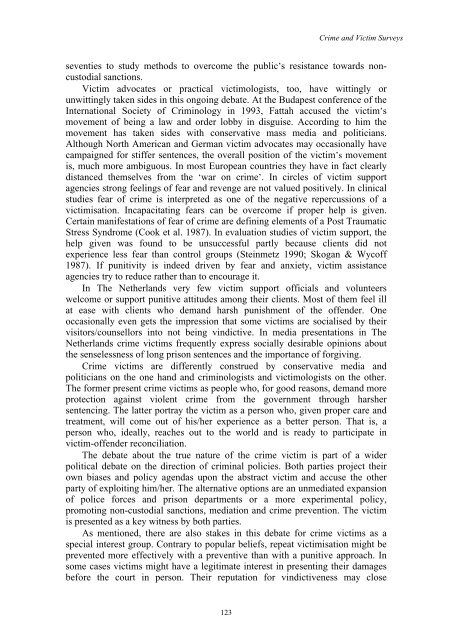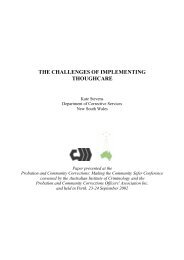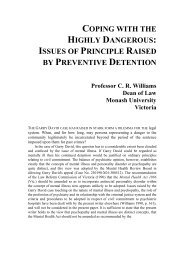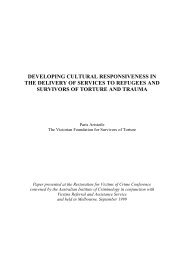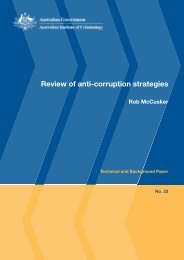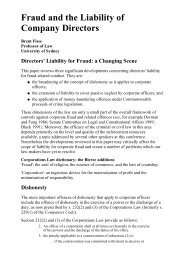Crime and victim surveys - Australian Institute of Criminology
Crime and victim surveys - Australian Institute of Criminology
Crime and victim surveys - Australian Institute of Criminology
Create successful ePaper yourself
Turn your PDF publications into a flip-book with our unique Google optimized e-Paper software.
<strong>Crime</strong> <strong>and</strong> Victim Surveys<br />
seventies to study methods to overcome the public’s resistance towards noncustodial<br />
sanctions.<br />
Victim advocates or practical <strong>victim</strong>ologists, too, have wittingly or<br />
unwittingly taken sides in this ongoing debate. At the Budapest conference <strong>of</strong> the<br />
International Society <strong>of</strong> <strong>Criminology</strong> in 1993, Fattah accused the <strong>victim</strong>’s<br />
movement <strong>of</strong> being a law <strong>and</strong> order lobby in disguise. According to him the<br />
movement has taken sides with conservative mass media <strong>and</strong> politicians.<br />
Although North American <strong>and</strong> German <strong>victim</strong> advocates may occasionally have<br />
campaigned for stiffer sentences, the overall position <strong>of</strong> the <strong>victim</strong>’s movement<br />
is, much more ambiguous. In most European countries they have in fact clearly<br />
distanced themselves from the ‘war on crime’. In circles <strong>of</strong> <strong>victim</strong> support<br />
agencies strong feelings <strong>of</strong> fear <strong>and</strong> revenge are not valued positively. In clinical<br />
studies fear <strong>of</strong> crime is interpreted as one <strong>of</strong> the negative repercussions <strong>of</strong> a<br />
<strong>victim</strong>isation. Incapacitating fears can be overcome if proper help is given.<br />
Certain manifestations <strong>of</strong> fear <strong>of</strong> crime are defining elements <strong>of</strong> a Post Traumatic<br />
Stress Syndrome (Cook et al. 1987). In evaluation studies <strong>of</strong> <strong>victim</strong> support, the<br />
help given was found to be unsuccessful partly because clients did not<br />
experience less fear than control groups (Steinmetz 1990; Skogan & Wyc<strong>of</strong>f<br />
1987). If punitivity is indeed driven by fear <strong>and</strong> anxiety, <strong>victim</strong> assistance<br />
agencies try to reduce rather than to encourage it.<br />
In The Netherl<strong>and</strong>s very few <strong>victim</strong> support <strong>of</strong>ficials <strong>and</strong> volunteers<br />
welcome or support punitive attitudes among their clients. Most <strong>of</strong> them feel ill<br />
at ease with clients who dem<strong>and</strong> harsh punishment <strong>of</strong> the <strong>of</strong>fender. One<br />
occasionally even gets the impression that some <strong>victim</strong>s are socialised by their<br />
visitors/counsellors into not being vindictive. In media presentations in The<br />
Netherl<strong>and</strong>s crime <strong>victim</strong>s frequently express socially desirable opinions about<br />
the senselessness <strong>of</strong> long prison sentences <strong>and</strong> the importance <strong>of</strong> forgiving.<br />
<strong>Crime</strong> <strong>victim</strong>s are differently construed by conservative media <strong>and</strong><br />
politicians on the one h<strong>and</strong> <strong>and</strong> criminologists <strong>and</strong> <strong>victim</strong>ologists on the other.<br />
The former present crime <strong>victim</strong>s as people who, for good reasons, dem<strong>and</strong> more<br />
protection against violent crime from the government through harsher<br />
sentencing. The latter portray the <strong>victim</strong> as a person who, given proper care <strong>and</strong><br />
treatment, will come out <strong>of</strong> his/her experience as a better person. That is, a<br />
person who, ideally, reaches out to the world <strong>and</strong> is ready to participate in<br />
<strong>victim</strong>-<strong>of</strong>fender reconciliation.<br />
The debate about the true nature <strong>of</strong> the crime <strong>victim</strong> is part <strong>of</strong> a wider<br />
political debate on the direction <strong>of</strong> criminal policies. Both parties project their<br />
own biases <strong>and</strong> policy agendas upon the abstract <strong>victim</strong> <strong>and</strong> accuse the other<br />
party <strong>of</strong> exploiting him/her. The alternative options are an unmediated expansion<br />
<strong>of</strong> police forces <strong>and</strong> prison departments or a more experimental policy,<br />
promoting non-custodial sanctions, mediation <strong>and</strong> crime prevention. The <strong>victim</strong><br />
is presented as a key witness by both parties.<br />
As mentioned, there are also stakes in this debate for crime <strong>victim</strong>s as a<br />
special interest group. Contrary to popular beliefs, repeat <strong>victim</strong>isation might be<br />
prevented more effectively with a preventive than with a punitive approach. In<br />
some cases <strong>victim</strong>s might have a legitimate interest in presenting their damages<br />
before the court in person. Their reputation for vindictiveness may close<br />
123


